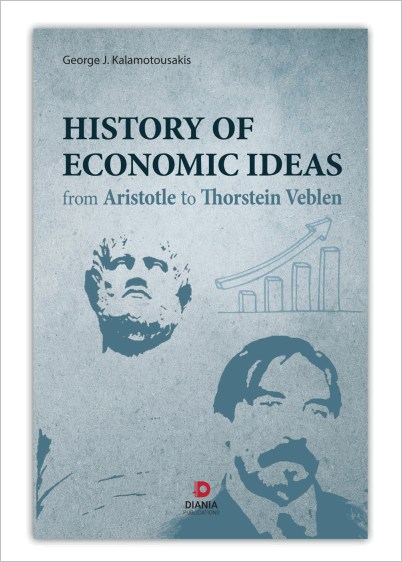0
Your Καλαθι
History of economic ideas
From Aristotle to Thorstein Veblen
Έκπτωση
10%

10%

Περιγραφή
The ancient Greeks recognized some economic concepts, such the incentive of self interest, gains from trade, role of interest and debasement of currency. Similarly the Romans moulded the doctrines of prosperity, taxation, contracts and interest into “Roman Law”, aiming at making econiomics a science of exchange.
The Middle Ages were characterized by evolutionary and revolutionary changes, where religious ideas prevailed. The Mercantilists placed emphasis on the formation of wealth, while the Physiocrats considered land as the most important agent of production and looked upon trade with scorn.
The publication of Adam Smith’s “Wealth of Nations” was without a doubt a revolutionary treatise in economic theory with obvious overtones of opulence and well-being.
This economic sunshine was transformed into somber darkness when the pessimists Robert Malthus and David Ricardo reached the scene. Their accent on pessimism suggested that a morbit future awaited society. Subsistance living and an iron clad law of wages were perhaps their two most important characteristics. Hence, Carlyle’s dictum of “The Respectable Professors of the Dismal Science”.
The most controversial writer of his age was Karl Marx. He wrote and published his treatise “Das Kapital” as a polemic against the capitalistic system, with England being the prime example.
Carey and Bastiat introduced an air of optimism and List-Sismondi-Say-Senior promoted the idea of making the Nation strong and self sufficient.
The Austrian School of the subjective analysis, introduced the concepts of Utility and Final Utility, reflecting Jeremy Bentham’s idea of Felicific Calculus.
While Marx and Sismondi made reference to the Business Cycle, Mitchell provided the analysis for the interpretation of the Business Cycle.
Hobson together with Pigou brought welfare economics to the foreground, while Veblen rejected the classical and neoclassical economics and put emphasis on the evolutionary change.
The Middle Ages were characterized by evolutionary and revolutionary changes, where religious ideas prevailed. The Mercantilists placed emphasis on the formation of wealth, while the Physiocrats considered land as the most important agent of production and looked upon trade with scorn.
The publication of Adam Smith’s “Wealth of Nations” was without a doubt a revolutionary treatise in economic theory with obvious overtones of opulence and well-being.
This economic sunshine was transformed into somber darkness when the pessimists Robert Malthus and David Ricardo reached the scene. Their accent on pessimism suggested that a morbit future awaited society. Subsistance living and an iron clad law of wages were perhaps their two most important characteristics. Hence, Carlyle’s dictum of “The Respectable Professors of the Dismal Science”.
The most controversial writer of his age was Karl Marx. He wrote and published his treatise “Das Kapital” as a polemic against the capitalistic system, with England being the prime example.
Carey and Bastiat introduced an air of optimism and List-Sismondi-Say-Senior promoted the idea of making the Nation strong and self sufficient.
The Austrian School of the subjective analysis, introduced the concepts of Utility and Final Utility, reflecting Jeremy Bentham’s idea of Felicific Calculus.
While Marx and Sismondi made reference to the Business Cycle, Mitchell provided the analysis for the interpretation of the Business Cycle.
Hobson together with Pigou brought welfare economics to the foreground, while Veblen rejected the classical and neoclassical economics and put emphasis on the evolutionary change.
Κριτικές
Δεν βρέθηκαν δημοσιεύσεις



